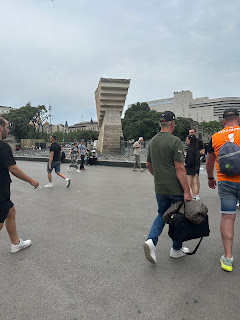Under the Law of the Koran: A Journey Through Spain's Islamic Heritage
Under the Law of the Koran: A Journey Through Spain's Islamic Heritage
On Tuesday June 10th, a couple of us went to the Museum of Catalonian History. This museum was very fun to visit because it was interactive. Therefore, it wasn't just reading about the history, but you could act things out, try things on, and other fun interactive activities. The staff was also very nice because with the Barcelona card, we would still technically have to pay a certain amount but because we are students, we got in for free. I learned a lot at this museum as there were three floors worth of history. I was interested in how they figured out what resources they had and what they did with it and how it then evolved. It was also cool the layout of all this information. For instance, how they started from the very beginning and then had different parts to each specific generation. The layout of the museum itself was easy to navigate to make sure you are going in the right direction regarding time and evolution. Under the Law of the Koran
In Barcelona, Islamic law, or Sharia, is not implemented as a parallel legal system. Instead, Spain's legal framework provides for the recognition and accommodation of Islamic practices within the broader context of Spanish law. The formal recognition of Islamic religious rights in Spain—including in cities like Barcelona—took place in 1992 with the passing of the Cooperation Agreement between the Spanish State and the Islamic Commission of Spain. The purpose of this law was to recognize the civil and religious rights of Muslims living in Spain and to allow for cooperation between the Spanish state and Islamic communities. This agreement grants Islamic communities certain rights, including recognition of Islamic places of worship, religious assistance, religious education, marriage and family matters. However, these rights are framed within the Spanish legal system and do not constitute a separate legal jurisdiction.
At the museum, I read that Al-Andalus was a multiethnic and plural society. Arabs and Berbers joined the Hispanic population, many of whom converted to Islam. The arrival of slaves from many different places added to the diversity. The Christian and Jewish communities were respected. Arabic spread, though neo-Latin languages survived. The Koran was the basis of Sharia, the Islamic code of law. The state, maintained the unity of the Muslim community. Religious groups regulated civil life through the law and schools and by determining what was politically legitimate.
Connection
To connect this topic with POL 130 and what we have learned about state strength, there are many different connections that can be made. As we learned in class, strong states are defined by their ability to enforce laws fairly and uniformly, manage diversity within their population, and maintain authority over all legal system within their borders. Spain’s recognition of Islamic rights through Law 26/1992 shows institutional capacity: rather than suppressing religious minorities or allowing parallel legal systems, Spain created a legal framework that integrates religious identity within a single legal system, reinforcing the authority and legitimacy of the state. One other connection was how they were allowing Muslims to practice aspects of their religion (e.g. religious education, prayer spaces, halal food, Islamic marriage rites) within the bounds of national law, Spain shows that it can absorb cultural and religious difference without losing legal coherence. This reflects a resilient form of state strength: one that adapts to pluralism rather than cracking down on it or losing control.
The Law of the Koran touched deeply on ideological debates around religion, secularism, liberalism, and others. I want to focus on liberalism because we talked about this and presented on this in POL 150, but also Secularism because I included this in my presentation. As I learned in class, liberalism believes in individual rights, freedom religion, equality before the law, and a secular governance. The relation of this to the Law of the Koran is how liberalism supports the right of Muslims to practice their religion freely. For example, building mosques, religious outfits, and prayer in schools. Liberalism opposes any religious law replacing or rivals state law, and how all laws must apply equally to everyone. Liberalism supports accommodation not legal pluralism. It defends religious freedom within the rule of law, which Spain's 1992 law tries to achieve. Lastly this law can relate to secularism. As I learned while researching for my presentation, secularism believes in strong separation of religion and state, especially in public life. This is a good example of a type of ideology that opposes my topic. For instance, secularism sees any state recognition of religious practices as problematic, especially in schools or government services. They may oppose the 1992 agreement/ law because it blurs the line between religion and state, especially when Islamic religious education enters public institutions.





Comments
Post a Comment